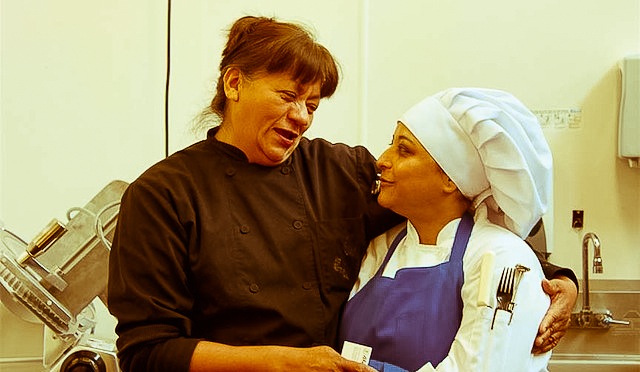By Rebecca L. Rhoades
When Binita “Bini” Pradhan first came to the U.S. from Kathmandu, she was surprised to learn that there were no Nepalese restaurants and no stores that sold her favorite Nepalese foods. Trained as a chef in Bombay, India, and by a mother who cooked for the Nepalese royal family in the 1960s, Bini sorely missed the foods of her homeland, which has sparked her lifelong passion for cooking. She toyed with the idea of opening her own restaurant, but as is the case for many immigrant women, making that dream a reality seemed impossible. Then last year, a friend introduced her to La Cocina.
Located on a quiet residential street in San Francisco’s Mission District, La Cocina is a nonprofit organization and incubator kitchen that provides affordable kitchen space and hands-on technical, legal and financial assistance to low-income immigrant women who wish to launch, grow or formalize a food business.

Like Bini, anyone interested in joining La Cocina’s program must first submit a business plan and undergo a rigorous interview process. There are three qualifiers: entrepreneurial spirit, low-income based on San Francisco HUD standards, and, of course, delicious food. Only three businesses are accepted each quarter.
“When women come to us, they already have a general idea of what their business will be,” says Angie McKee, Retail and Catering manager for La Cocina. “Of course, all of them know how to cook. They’re fabulous cooks. Their food is delicious. But cooking for a business is totally different from cooking for a family.”
Once accepted into La Cocina, businesses enter a six-month pre-incubation period, during which time they are offered technical assistance on everything from branding, marketing and logo creation to help with adapting their recipes for a mass market. This is followed by the incubation period, when the business becomes operational, which can last anywhere from two years for packaged products to upwards of five years for prepared foods. “With our businesses, we’ve found it takes much more to open a restaurant than it does to sell a packaged product,” notes McKee. Graduation is organic. Businesses continue to grow throughout the incubation period until they can no longer produce in La Cocina’s small kitchen or until they become economically self-sufficient.
Today, Bini is the owner of Bini’s Kitchen; her business is thriving with the help of La Cocina’s pre-incubation program. “She’s rapidly moving into incubation because she’s such a driven woman,” says McKee. She sells authentic and delicious dishes like Gurkha Chicken, Yellow Daal Tadka and Cucumber Raita for home delivery through her website, biniskitchen.com, and every Friday, you can find her at the city’s popular Off the Grid food truck gathering at Fort Mason, her first formal selling location, where she peddles her homemade turkey and vegetarian momos, a type of steamed Nepalese dumplings served with tomato-cilantro dipping sauce. And everything is made with Bini’s special blend of spices that she grinds and sun-dries herself.
As I sample some of Bini’s delectable momos, another La Cocina entrepreneur, Alicia Villanueva, stops by with some of the best-smelling tamales I’ve ever eaten. Alicia, who emigrated to the U.S. from Mazatlan, Mexico, 10 years ago, is the owner of Alicia’s Tamales Los Mayas, which is currently in incubation.

“Alicia is the perfect example of someone whose business is growing to the point of graduation,” says McKee. “She was making 50 tamales a week when she started; now she’s making 3,500 tamales a week.”
Alicia also employs six workers, and in the true spirit of giving back to the community that helped her succeed, she pays for all of them to take English lessons.
“Right now, I am working on my American dream, giving my kids the best and saving for their education,” says Alicia. “I have six ladies working for me, and I feel like they are another kind of family. I have to support them. When I was accepted [into La Cocina], my life really changed for the best. In the end, I have the satisfaction of knowing that this is my business. And as I always say, the best tamales are stuffed with love, and the best people are stuffed with my tamales.”
About one mile south of La Cocina, in San Francisco’s Bernal Heights neighborhood, is 331 Cortland Street. Here, in a tiny storefront carved into even smaller kiosks, are two of La Cocina’s success stories: Eji’s Ethiopian and AnDa Piroshki. I had a chance to speak with the owner of AnDa, Anna Tvelova, who came to California from Sochi, Russia, five years ago.
“When I first got here, I barely spoke English. I wasn’t even able to read about what needs to be done to open a business,” she says. “La Cocina has been like a GPS for my business. They connected me with specialists””people who do web design and logo design””who work pro bono or for a very little fee. They connected me with other businesses.

“I use my mom’s recipe, but when I started making hundreds of piroshkis [Anna refers to them as Russian hot pockets], the recipe, the dough, didn’t work,” she adds. “Michel [Saus, president of the San Francisco Baking Institute] helped me for free. He took my recipe and scaled it up for the production.
“Getting into La Cocina has been an amazing opportunity. There are a lot of low-income, immigrant women who love to cook and who would love to start a business but think it’s so scary. La Cocina just makes it easy.”
From Kika’s Treats, a small artisan company whose handcrafted chocolate-covered organic baked goods can be found in such high-end retailers as Dean & Deluca and Williams-Sonoma, to La Luna Cupcakes, a one-month-old brick-and-mortar cupcake shop in San Francisco’s Crocker Galleria, La Cocina has helped establish 14 businesses since it was first founded in 2005, including seven brick-and-mortar businesses. Its biggest success story is El Huarache Loco in neighboring Larkspur, California. Owner Veronica Salazar of Mexico City came to La Cocina in 2005 with a desire to sell Mexican huaraches, corn masa cakes shaped like the sole of a shoe (huarache, in Spanish, means sandal), filled with beans and topped with a variety of meats and vegetables. According to McKee, Salazar now has 21 employees and is set to do a million dollars in sales this year.
“In terms of economic self-sufficiency, our women aren’t looking to make a million dollars,” says McKee. “When we ask them what economic self-sufficiency means, they usually say $50,000 to $80,000. They just want enough to live a good life, to support a family, but not to be millionaires.”
Of course, not every graduate of La Cocina is female. Take, for example, Koji Kanematsu, owner of San Francisco’s only onigiri restaurant, Onigilly, the first business run by a male owner in the entire program.

“We’re predominantly a women’s organization, but we do work with some men. We’re about 98 percent women,” says McKee. “But if there’s a guy like Koji who comes to us with an incredible product, we’ll talk to him and see if he really wants to be a part of the program and if he needs the resources we provide.”
Growing up in Japan, Koji enjoyed eating American fast food, so when he came to the U.S. seven years ago, he wanted to introduce Americans to traditional Japanese fast food. What exactly are onigiri? Simply put, they’re rice balls, traditionally made from white rice, although Onigilly uses a more healthy brown rice, formed into triangles and wrapped in seaweed. Each onigiri is also filled with a variety of toppings, from miso tuna to spicy shrimp, ginger beef to chicken teriyaki.
“This is the item I brought to La Cocina,” says Koji. “We did a lot of focus groups, and we improved the shape, the amount, the taste. Traditional onigiri is about 10 percent filling and 90 percent rice. But nobody likes to eat a lot of rice. So I changed the style. Now they’re about 30 percent filling and 70 percent rice.”
It’s a recipe that seems to be working. In addition to his thriving business in the city’s Financial District, Koji owns the Onigilly food cart, which can be found at various spots throughout the city as well as Fort Mason’s Off the Grid.
“When I first started my food business, I had a hard time getting information,” says Koji. “But once I joined La Cocina, they connected me with a lot of industry professionals, volunteers, even lawyers. I could ask anything, anytime.
“The program is really organized. Every month, we had to set up a goal. For example, I needed to make a recipe book or come up with a list of food costs. Those things really motived me,” he adds. “If I had done it by myself, it would have been really tough.”
Now, Koji has plans to franchise his business, with the hopes of opening 500 locations throughout the country.
Whether they dream of owing a food truck, a packaged product business or a brick-and-mortar restaurant, La Cocina helps San Francisco’s immigrant women””and men””take their country’s traditional foods and turn them into full-fledged businesses.

“La Cocina is a great program,” says Bini. “I would encourage each and every woman to come here and give it a try. They will guide you every step of the way. You will be in good hands.”
To learn more about La Cocina or to connect with any of the businesses mentioned here, visit lacocinasf.org.
 ABOUT THE WRITER
ABOUT THE WRITER
Rebecca L. Rhoades is a writer and photographer with a passion for exploring the world and its cultures. After living and working as a medical editor for many years in New York City, she found a new life in Philadelphia and her calling as an editor of a travel magazine. When not working, she enjoys sleeping late, discovering great restaurants, and searching for the perfect margarita. Follow her on twitter @rlrhoades
All photos by Rebecca L. Rhoades




